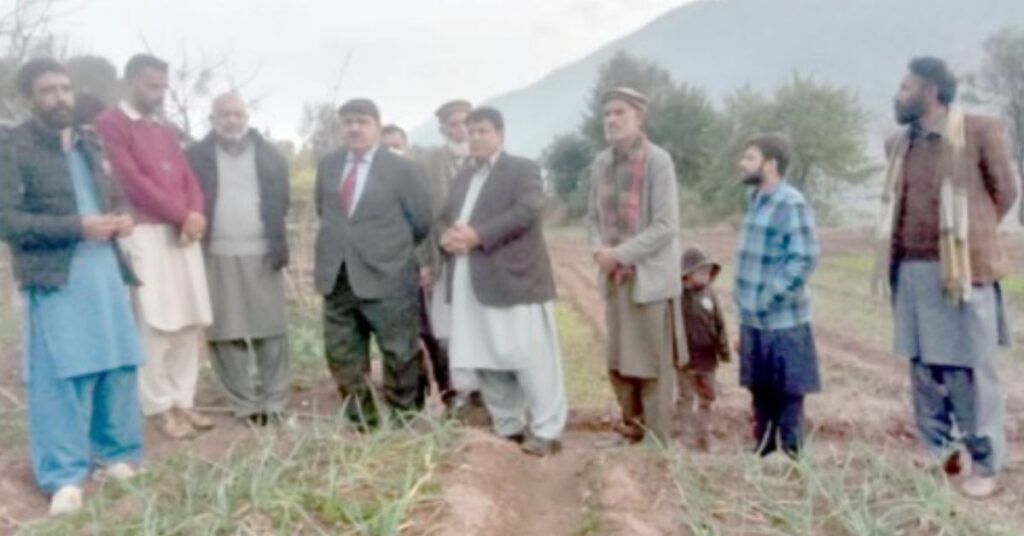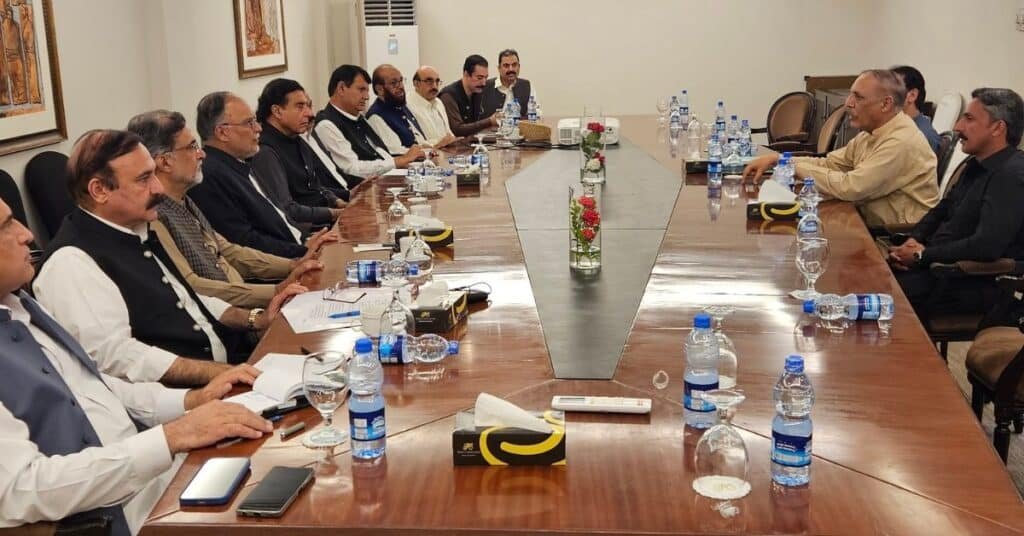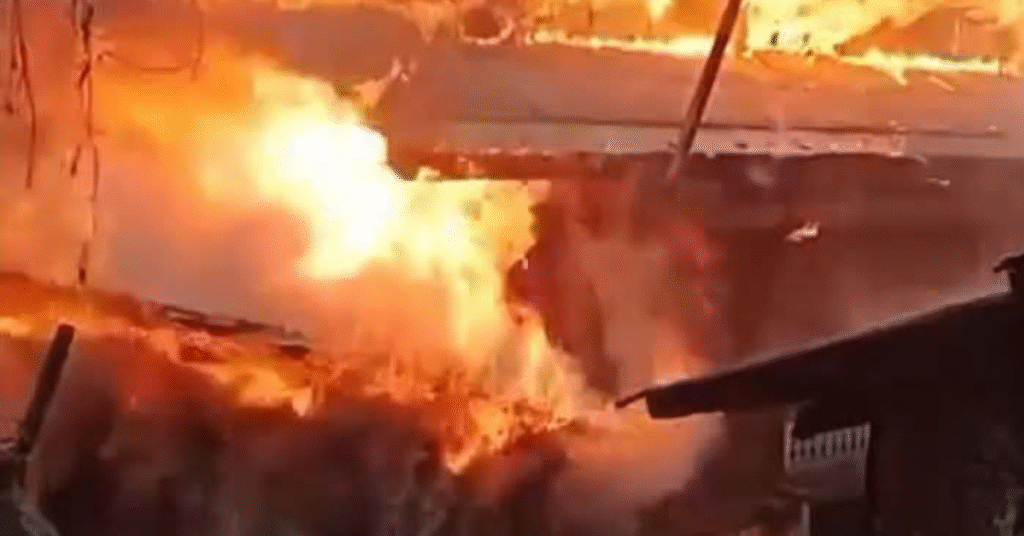By: Kashmir Investigation Team
MIRPUR: The Rathoa-Haryam Bridge in Mirpur, Azad Kashmir, has a lengthy and complex history. Initially approved in 2006 with a budget of Rs 1.394 billion, the project’s cost ballooned to Rs 9.58 billion due to various delays and design changes.
The Azad Kashmir government says that in the last financial year, the Pakistani government has released Rs 3.3 billion for the construction of the Rathua-Haryam bridge and claims that the bridge can be completed in the current financial year.
Earlier, in February 2024, the Executive Committee of the National Economic Council (ECNEC) of Pakistan had approved the revised PC-1 for the third time at Rs 9.58 billion.
The length of the bridge is 2.975 km, while there is a 1.925 km road to reach the bridge from Mirpur and a 2.281 km road to reach the bridge from Islamgarh.
The construction of the bridge is being carried out by the Project Management Unit of the Public Works Department of the Azad Kashmir government.
But the main question is why the construction of this bridge was delayed, and how did the cost of this bridge increase from 1 billion 394.653 million to 9 billion 582.7 million?
Initially, in 2006, the Pakistan Planning Commission approved the construction of this bridge for 1 billion 394.653 million rupees. The strength of this bridge included a 556-meter-long cable-stayed section.
This section of the bridge was to be tied to one or two large pillars with strong wires (cables). These cables support the bridge so that it stands firmly and can bear the weight.
In January 2007 and November 2008, the process of evaluating the qualifications of construction companies for the construction of the bridge and the access roads to the bridge was initiated.
On 3 June 2009, a revised PC-1 worth Rs. 5,819,436,000 was submitted to the Ministry of Kashmir and Gilgit-Baltistan. This PC-1 was prepared on the basis of the lowest bidder.
In September 2009, in the wake of the decision of the Central Development Working Party (CDWP) of Pakistan, a high-level technical committee was formed, which was tasked with finding an alternative solution other than the cable-stayed bridge to rationalize the cost of the project.
The committee finalized the conventional RCC prestressed bridge. The National Engineering Service of Pakistan (NESPAK) designed the 2.975 km long RCC bridge, and in May 2011, the Executive Committee of the National Economic Council of Pakistan (ECNIC) approved the PC-1 for Rs 4,232,855,000, and the bridge was scheduled for completion in June 2014.
The bidding process was launched on 15 June 2011, and the lowest bidder, “Basin – Skyways (Joint Venture)”, was awarded the contract to construct the bridge in August 2011.
Consulting services for continuous monitoring of the bridge site were provided to NESPAK. The company commenced the bridge work, but the company failed to complete the RCC work of three deep grids in the deep channel area during the time available as per NESPAK’s design during 2012-2013 due to high water.
During the RCC bridge work, NESPAK resumed additional geotechnical studies in 2012-2013, and included extensive additional RCC substructure work in the channel area.
Given this, a revised PC-1 of Rs. 5,392,879,000 was submitted to the Ministry of Kashmir Affairs and Gilgit-Baltistan in December 2014.
The Project Steering Committee on 9 March 2015 directed for third-party verification of the RCC bridge design prepared by NESPAK.
For the third-party verification, AA Associates Karachi was appointed as the consultant, which proposed a 160-meter-long steel bridge for a section of the bridge.
The design of the 160-meter-long steel bridge was prepared by the Chinese company CBBRG, after which the design was verified by AA Associates Karachi. The fees of the design and verification experts were paid by the construction company.
Because of this, a revised PC-1 of Rs 6,481,590 was prepared in 2016 and submitted to the Ministry of Kashmir Affairs and Gilgit-Baltistan.
The Ministry of Kashmir Affairs approved the revised PC-1 in October 2017, including a 160-meter steel bridge. The cost of this steel bridge was proposed at Rs 1,438,670.
How It All Started
On July 10, 2017, and October 6, 2017, ECNEC approved the revised PC-1 of Rs. 6,481,590,000, and extended the project for the second time, setting a deadline of June 2018. The money was also transferred to the Azad Kashmir government.
Despite the approval of the money and the second extension of the project, the Project Director of the Public Works Department of Azad Kashmir, PMU, issued a variation order of Rs. 1,212,780,000 to the company two years later, i.e., on October 23, 2019.
This means that the Azad Kashmir government did not issue the variation order on time despite having the funds, and it was deliberately delayed by two years. Due to the delay in issuing the variation order, the company refused to accept the prices given in this order.
The negligence of the Azad Kashmir government can be gauged from the fact that the Chief Engineer of the Highways Department held a meeting with the company on October 15, 2020, a year after the issuance of the variation order, which was unsuccessful.
The Chinese company then approached the company for mediation on December 30, 2020.
The Azad Jammu and Kashmir government formed a committee on February 2, 2021, whose responsibility was to resolve the dispute between the company and the project authorities over the cost of the 160-meter-long steel bridge and submit a report to the relevant authorities regarding the delay in the implementation of the project.
On April 6, 2021, the Ministry of Kashmir Affairs and Gilgit-Baltistan of Pakistan extended the project till June 30, 2021, on the condition that action be taken against those responsible for the delay in the implementation of the project.
Instead of taking any action against the officials of the Public Works Department and the project manager, the government removed the project manager from his post and appointed a new project manager.
The DDWP also approved the third extension of the project implementation period till June 30, 2021.
The Chinese company Basin-Skyways (Joint Venture) submitted new rates of Rs 4.16 billion for the construction of the steel bridge on May 4, 2021.
The project consultant raised some objections to this cost estimate. The project authorities sought clarification from the company; however, the company was not ready to negotiate on the price until its other demands were met.
The company also issued a notice expressing its intention to initiate arbitration regarding the performance guarantee under clause 67.1 of the agreement.
The company also filed a writ petition against the employer and the PMU authorities in the District Court Muzaffarabad, Azad Kashmir. Later, according to official documents, the Chinese company refused to construct the steel bridge due to the old rates and terminated the contract.
What was the loss?
If the project director had issued a variation order in 2017, the bridge would have been completed for about Rs 6.5 billion.
But due to the fact that the variation order was not issued on time, the cost of the bridge reached Rs 9.58 billion. This meant that an additional cost of about Rs 3.10 billion was incurred.
But the authorities are unable to answer the question of why no action was taken against those who delayed the construction of the bridge and caused damage of more than Rs 3 billion.
After a three-year hiatus, work on the bridge resumed in 2024, and the completion date of the project has been set for June 2027. There will be no further extension of the project, nor will any additional funds be given.
Now the bridge is being constructed by the FWO and its design has also been changed — that is, an RCC bridge is now being built in place of the steel bridge.




